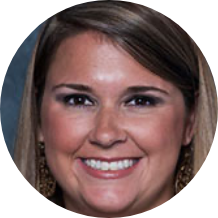University of South Carolina was recognized with 2019’s Champion Campus Labs Award for their impressive work implementing and expanding our Anthology Portfolio (formerly Chalk & Wire)® solution across their School of Education. Their method involved close collaboration with faculty and led them to outstanding data to share during accreditation and program reviews. Lisa Peterson, the Director of the Office of Assessment and Accreditation, tells the story here.
Q: What have been your most notable highlights or accomplishments since winning the 2019 Campus Labs Champion Award?
A: The Anthology Portfolio (formerly Chalk & Wire)® functionality continues to provide our college with efficient data collection and reporting, playing a crucial role in our accreditation and program reviews. Since 2019, we have moved all our advanced programs into the system, helping us create a systematic way to collect and analyze data for annual assessment plans and future external reviews.
Students can also now easily keep track of all their work from the start to end of their programs and use highlights from coursework to feature in their own personal portfolios. Some students have created portfolios beyond class requirements that they can carry with them into interviews and their own classrooms.
Another highlight is how many of our initial licensure programs have moved past solely using the system for key assessments. We’re now starting to take advantage of its features in other creative ways to make work easier and more efficient. One of our online undergraduate programs and a cohort of Med students now use the system for all their virtual lesson reviews, so students and instructors can share feedback and collaborate with one another in one secure place.
Q: What has been the impact of your work so far on larger projects such as accreditation and program review?
A: Anthology Portfolio (formerly Chalk & Wire)® was significant during our CAEP Accreditation visit and state report during 2017, and I honestly don’t know how we would have collected all the unit-wide data for these reviews without it. Having the ability to attach assessments to our field placements has made this a simplified process so that all our supervisors (even those that are not tech savvy) can effortlessly enter in their interns’ evaluations each semester.
We also uploaded all our evidence and documentation for our state report and then shared a link to the State Department. All our initial licensure programs—along with the advanced Counselor Education program—will be undergoing program review again in 2021 and since all of their key assessments have been housed in the system over the past few years, this will allow for faculty to quickly and easily access the data needed for these reports. They can also track trends and make programmatic changes as needed.
Q: Looking back, what do you think made your implementation so successful?
A: A big factor was the ongoing collaboration and support between the Office of Assessment and Accreditation (OAA), college leadership, and faculty. Another was the overall commitment to continuous improvement from our faculty. OAA staff provides ongoing support to faculty and students through trainings, webinars, email/phone correspondence, and one-on-one meetings as needed to ensure the data collection process runs smoothly each semester. During the early stages of implementation, OAA provided training to all faculty of key assessment courses in our initial licensure programs first. Once this process was in place and successful, we started inviting other faculty and staff members to work with us to determine ways in which the system would best support their work.
Our sincere thanks to Lisa Peterson for sharing her experiences with us. If you’d like your campus to be showcased, reach out to your consultant.
